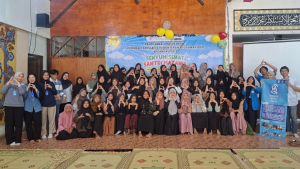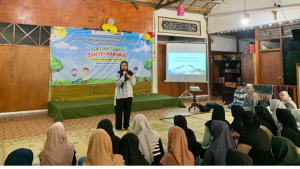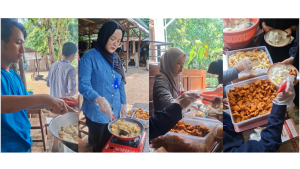
Indonesia is currently listed as one of the countries with the highest food waste production in Southeast Asia. Each year, millions of tons of food are wasted and left to rot in landfills, releasing methane gas that contributes to global warming and climate change. Ironically, amid this abundance of food waste, Indonesia continues to face a hunger crisis. Our World in Data reported 38,860 deaths caused by malnutrition in 2021 alone.
To address this issue, the community service team from the Faculty of Medicine, Public Health, and Nursing at Universitas Gadjah Mada (FK-KMK UGM), led by Marina Hadiyanti, S.Gz., M.Sc. from the Department of Nutrition and Health, has partnered with Komunitas Berbagi Bites Jogja (BBJ) to support food waste reduction initiatives. BBJ is a community initiative under the Center for Pancasila Studies UGM, with a mission to rescue surplus food and redistribute it to those in need.
Over the past eight months, BBJ has successfully recovered over 1,000 kilograms of surplus food from hotels, cafés, and restaurants partners, and distributed it to over 5,000 beneficiaries, also known as food heroes. One of BBJ’s flagship initiatives is the open kitchen program, which utilizes surplus frozen food from partner companies to prepare nutritious meals for distribution through collaborating foundations.

On Sunday, 1 June 2025, the open kitchen event was held at Yayasan Madania. This event was particularly special as it featured a nutrition education session for the children of Yayasan Madania, themed “Penuhi Gizi, Asihi Bumi.” The session, led by Marina Hadiyanti, S.Gz., M.Sc., focused on the nutritional value of donated food, food classification and its contents, how to make wise food choices, and debunking common myths about food donations. The children also learned how to read nutrition labels as part of an effort to improve nutritional literacy.

The children actively and enthusiastically participated in quizzes, pre-tests, post-tests, and interactive games that turned learning into an enjoyable experience. The event ended on a heartwarming note with a shared meal prepared by BBJ volunteers, proving that surplus food, when handled properly, can be both nutritious and delicious. Through this educational and participatory approach, children are encouraged to appreciate their meals, make healthier choices, develop awareness about food sustainability, and participate in the movement to reduce food waste. This small step is expected to inspire long-term habits that benefit personal health and the planet.
Contributor: Annisa Fitria Nur Azizah
SDGs: 2. Zero Hunger; 3. Good Health and Well-Being; 12. Responsible Consumption and Production; 13. Climate Action; 17. Partnerships for the Goals
